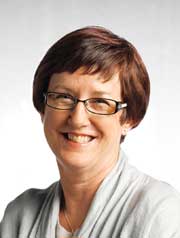18 October 2012

In the 21 years since UniSA was established, it has awarded more than 21,000 degrees in teaching.
While some teachers exit the profession and some come back to further study and research, most are out there in classrooms across the state, the nation and even overseas. And in their thousands, they’re making a difference to the development and success of millions.
Associate Professor Rosie Le Cornu (pictured below), 2009 Teacher Educator of the Year, says teaching is one of the most influential careers to which a person can aspire.
“Research shows that next to a child’s family background, the role of the teacher is the most important in supporting a child’s development and success,” she says. “That is a huge responsibility but also a privilege.”
She says while there are some well-accepted standards and guidelines about what makes a good teacher, through both its teaching and research UniSA is concerned with developing great teachers.
“What sets a great teacher apart from a proficient one can be complicated and particular to each individual, but a couple of core factors are passion and compassion and a commitment to continue to learn in the job,” Prof Le Cornu says.
 “Great teachers need to work in a classroom, understanding that one size does not fit all when it comes to learning. They need to want to be with the kids they are teaching and to have the ability to care about every child, how they learn, what factors will support that learning and how they can deliver personal success for each child. They need above all else to be able to build a positive learning relationship with each child.”
“Great teachers need to work in a classroom, understanding that one size does not fit all when it comes to learning. They need to want to be with the kids they are teaching and to have the ability to care about every child, how they learn, what factors will support that learning and how they can deliver personal success for each child. They need above all else to be able to build a positive learning relationship with each child.”
She says possibly one of the biggest challenges for new teachers is walking the line between being accessible, human, and warm in the classroom but also keeping the relationships professional and within boundaries.
“Teaching is tough. It can also be so rewarding because teachers have the very real opportunity to make a difference to children’s lives and for some, to be the circuit breakers in a cycle of poverty.”
Prof Le Cornu says UniSA-educated teachers are given the best start possible through Professional Experience courses, which enable workplace learning that is integrated with academic preparation and educational studies. These courses highlight the learning of skills and attitudes to become critically reflective practitioners.
“A great teacher thinks about how they do their job and looks to learn and improve. They contribute to the culture of the school and can work as part of a teaching team. And most importantly, they care about equity and social justice. A great teacher understands that they can be an agent of change in society and they keep the passion alive to do just that.”
By Michèle Nardelli



